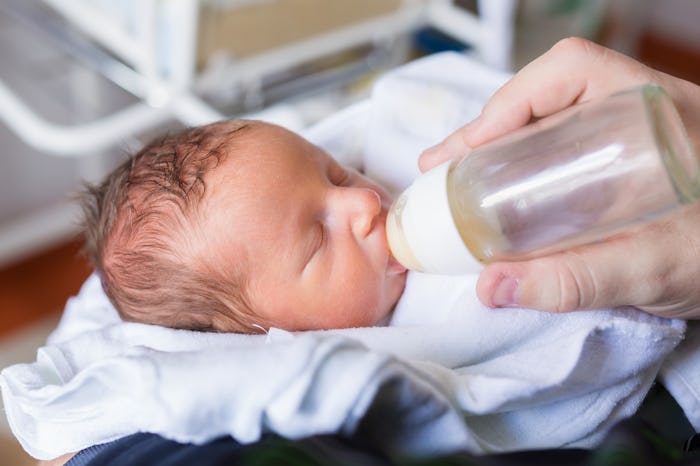Life

Here's When You Can Expect To Feed Your Baby For The Very First Time
The first few hours after childbirth are a whirlwind of emotions unlike anything else you'll experience in life. I remember feeling vulnerable and elated and nervous all at the same time. You worry over your baby like you've never worried before, including how and when to feed them. But, how soon do you feed your baby after they're born? Is there a gold standard for bonding and health, or is it more individual than a standard prescription?
When I had my first child, I was completely out of it after his birth. I couldn't have told you my name, let alone when or how I would be feeding him. Nevertheless, I remember my nurse bringing him to feed somewhere in the haze of my delirium. When I had my daughter, it was a completely different situation. I was eager to feed my little princess, and because I was coherent, I remember all of it. The funny thing is that while she breastfed first, my son breastfed the longest. What can I say? He was a hungry boy who liked routine. (Technically, he's still a hungry boy who likes routine, but that routine is all avocados and wasabi seaweed now, thank the heavens.)
So, how soon do you feed your baby after they're born? Does it vary whether you're breastfeeding or formula feeding?
Both of my babies were breastfed, but we all know that not all women can or want to breastfeed. I spoke to labor and delivery nurse Teresa Sivec, RN, to find out when exactly formula fed babies should be given their first "straight out of the uterus" meal. She tells Romper, "It's not an exact science. We generally give them their first bottle within the first hours of birth, sometimes sooner. The thing we really focus on is giving the family time to bond. We encourage skin to skin time, talking to the baby, and we monitor their comfort." She said babies are just as rattled after they're born as the mother is from birthing them, and it's calming just to be on their parent's chest. Many parents choose to feed them during or after this bonding period. "Once that little guy gets tucked up nice and snug against Mommy or Daddy, they tend to take the bottle better, as they're more comfortable in their surroundings."
I imagine it's like how I like to eat my pizza cuddled up in a huge comforter on the sofa with my wine in a straw cup. I know the added level of comfort really increases my joy of eating.
International Board Certified Lactation Consultant (IBCLC) Amber Edwards tells Romper that for breastfed babies, it's a little different. "Babies should be fed as soon as possible after birth. Babies are born with the ability to seek out your breast milk by scent, and getting them accustomed to it, and providing that reward of feeding really helps the baby nurse." She also says that the period of time right after birth is a crucial bonding period, and that the act of breastfeeding helps to cement those bonds with the joint release of oxytocin between the mother and the baby. Breastfeeding releases that chemical in the mother and the child, triggering the reward sensor in their brain.
"It's also very beneficial for the mother to nurse right after birth as the oxytocin that's released with breastfeeding also helps to contract the uterus and bring it back into shape after housing your child for 40 weeks." I remember vividly the postpartum contractions and being very cheesed off no one told me that the contractions just keep coming even after you deliver. Had I understood that breastfeeding could speed that up, I'd have kept my babies attached to me even more than they already were.
While there's no standard operating procedure for feeding your baby after they're born, it does seem to be standard that bonding with the parents is a part of the process. That's something everyone can get behind, no matter how you choose to feed your baby.
Check out Romper's new video series, Romper's Doula Diaries:
Check out the entire Romper's Doula Diaries series and other videos on Facebook and the Bustle app across Apple TV, Roku, and Amazon Fire TV.